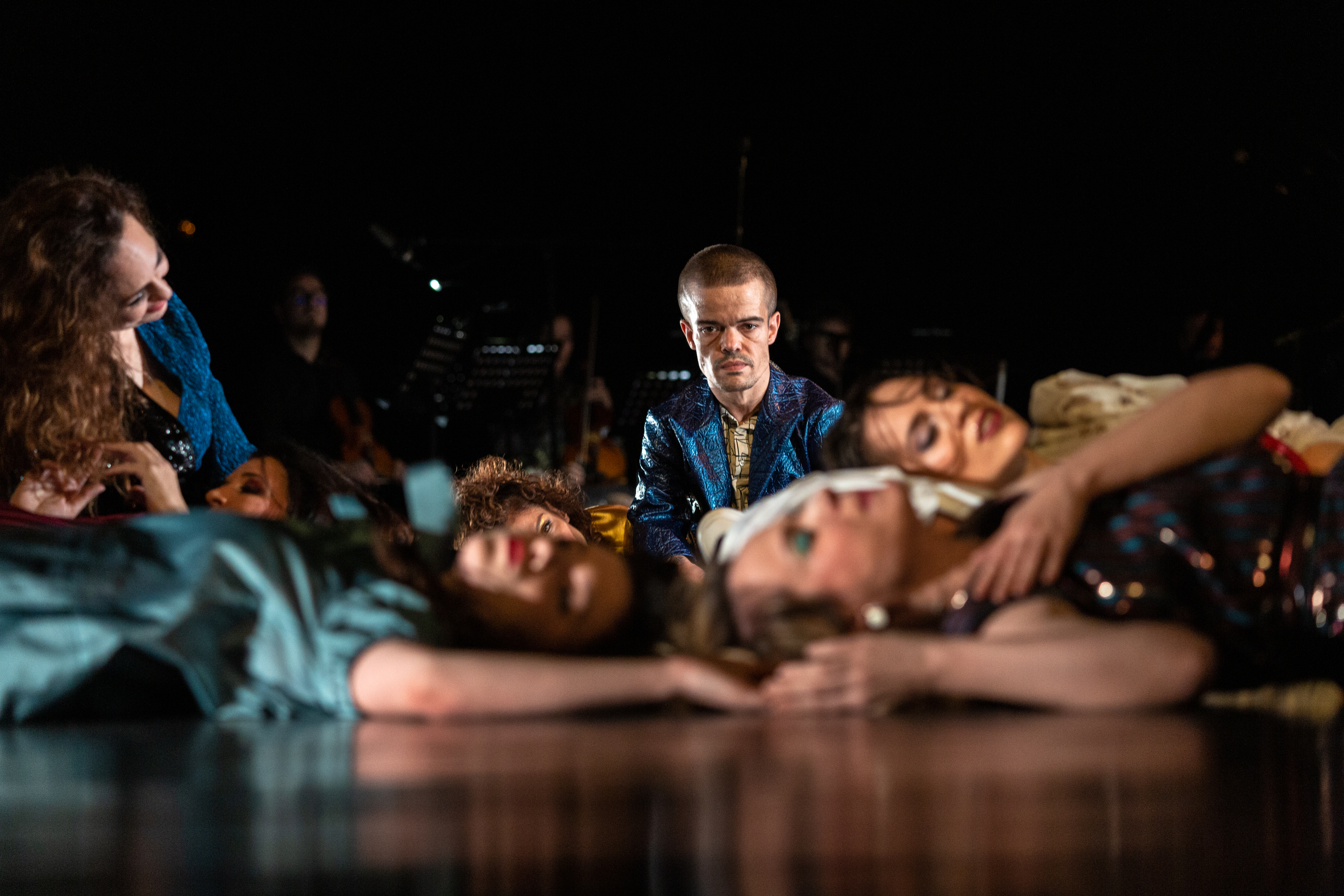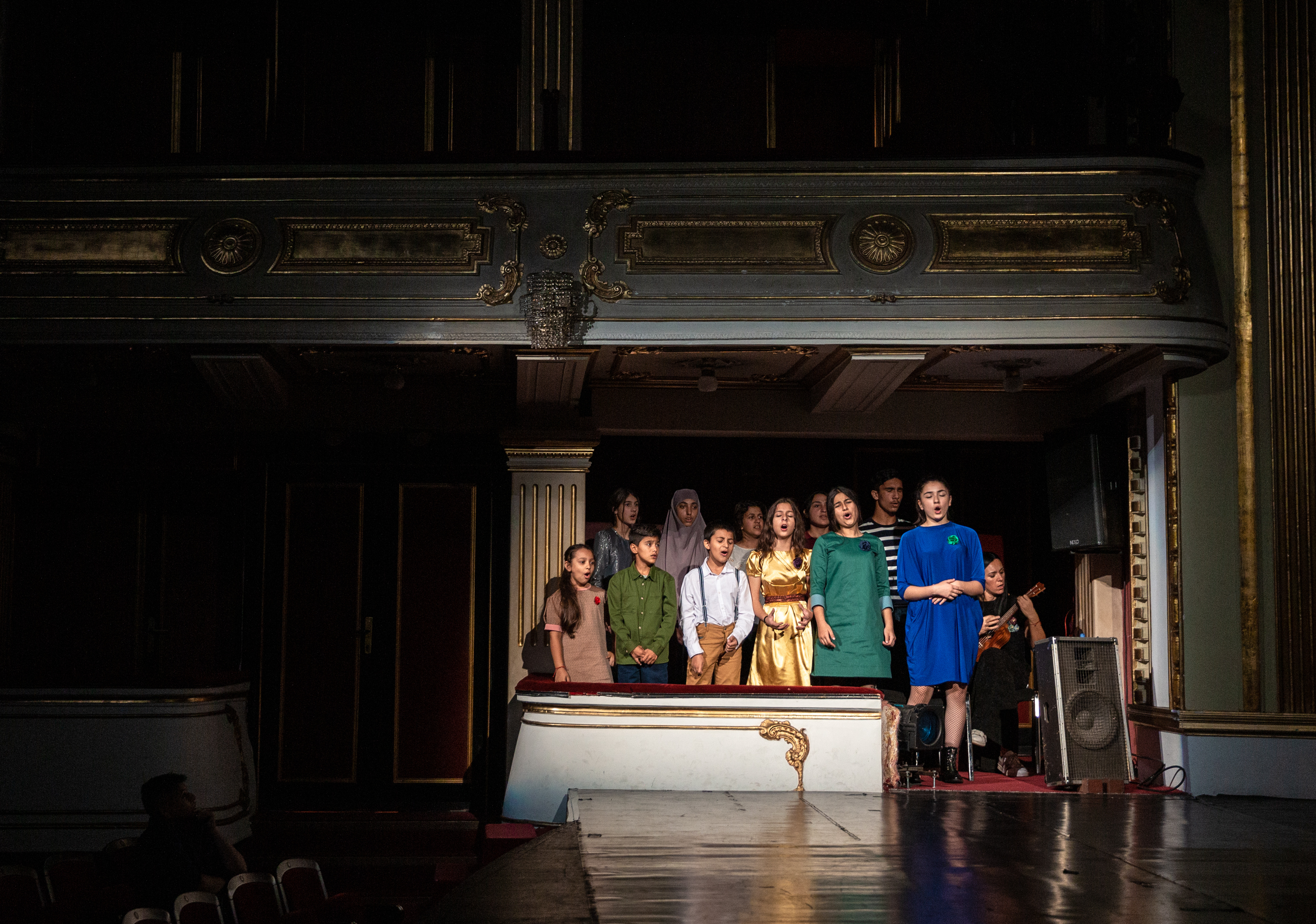
PERFORMANCE REVIEW
Children, an opera in seventeen songs, with music by Irena Popović, based on the novel by Milena Marković. Belgrade, National Theatre, October 8, 2022.
Sofija Perović
Sound Stage Screen, Vol. 2, Issue 2 (Fall 2022), pp. 161–66, ISSN 2784-8949. This work is licensed under a Creative Commons Attribution 4.0 International License. © 2022 Sofija Perović. DOI: https://doi.org/10.54103/sss19975.
Children is an opera in seventeen songs composed and staged by Irena Popović. The libretto, based on the award-winning novel/poem of the same name by Milena Marković, was written by dramaturg and playwright Dimitrije Кokanov (who ventured for the first time into the world of operatic librettos), while the choreography was created by Igor Koruga, the scenography by Miraš Vuksanović, the costumes by Selena Orb, and the musical dramaturgy by Jelena Novak. The structure of the opera resembles a soundtrack where each song could be listened and performed independently but, when put together, these seventeen “songs” create a coherent theatrical work which made quite an impact on the local audience in Belgrade, Serbia. The work consists of a prologue and three parts: “The Skyscraper Forest,” “Sea of Tears, Mother’s Milk and Children’s Urine,” and “The Wind” in which the topics—such as growing up in the blocks of New Belgrade, a complicated relationship with the mother, teenage pregnancy, the search of identity in a no-longer existing country—are brought up.
Children had its world premiere on October 8, 2022, on the main stage of the National Theatre in Belgrade, the institution that hosts opera and ballet productions in the Serbian capital since the nineteenth century, with the opera ensemble being officially formed in 1919. [1] Even though the opening of an independent opera house has been the main focus of the Ministry of Culture of the Republic of Serbia (and formerly Yugoslavia) for almost half a century, with every other government promising to prioritize the construction of the opera house, Belgrade still does not have one. The fact that this brand new chamber opera, composed and staged by a contemporary Serbian composer such as Irena Popović, opened the National theatre season 2022/2023 brings a ray of light and hope for the future of opera in Serbia. This is also the first time that the National theatre in Belgrade produced a contemporary opera based on a present-day novel. The attention that was accorded to the creation of this opera in the media and the public is without precedent. Probably, the main reason lies in the work of Milena Marković (1974), a dramatic author and poet whose book Children won the most prestigious literary award in Serbia (NIN award) for best novel in 2021. This choice made by the jury was, to say the least, surprising, since Children is not really a novel – it is a poem – and giving an award for the best novel to a book that doesn’t strictly belong to this genre was a very bold and unexpected move. But no matter how controversial and certainly unprecedent this choice might seem, the reactions of the general public and literary circles were unanimously positive.


Fig. 1 and 2. Children by Irena Popović, National Theatre in Belgrade, 2022, © National Theatre in Belgrade.
In Children, the voice in all its meanings and forms is predominant. The composer, who is also the stage director, rethinks voice as a tool, in opera and on stage, by juxtaposing operatic and regular singing. By means of the voice (and of being vocal), the very idea and notion of expressing oneself freely, truly, and completely despite the restrictions imposed by internal and external factors—such as a conservative upbringing, social expectations, traditional concepts of gender roles, among others—are also questioned in this operatic piece. In the patriarchal society, such as the Balkan one, the children’s voices are united with the female voices which are altogether often neglected, considered as second grade, misunderstood, regarded as not serious enough, not important and, even when expressed, not taken into consideration. In her book, Milena Marković tries to represent all those voices through the prism of autofiction and her own growing up in former Yugoslavia. Although at the first glance it might seem like an inner quest, a search for the lost childhood, the poem is much more than that. As writer Miljenko Jergović said: “It is a dangerous novel about history, the most important and traumatic one for us, which starts with the Second World War, continues through the eighties, the decade of our growing up, and overruns us during the nineties.” [2] The collective aspect of this poem is emphasized and made obvious in the opera where the author(’s voice) is “represented” by fourteen actors, three singers, and the choir. Irena Popović took direct inspiration for this collective aspect of the opera from Marković’s novel: “In the music I composed for Children, I tried to find the tone of the collective voice, i.e. Milena’s being. The complexity of Milena’s poetry and its many layers allowed me to make this collective voice both operatic and ordinary, childlike and also perfect in its imperfect tone. The voices in Children are a unique combination of things that cannot be combined, and it seems to me that we get an overtone that floats through spaces and simply refuses to be defined and caught in the trap of classical analysis.” [3]
Although Marković examines the specific issues related to the generations that grew up in former Yugoslavia (the country that became a sort of Neverland for many) and that, because of the historical events in their country, were not able to become independent adults—they could not find their ways in the war and the transition stricken newly formed countries; they couldn’t manage to get the jobs which would enable them to leave their parent’s houses and have enough means to create and provide for their own families; and they got stuck in a sort of Peter Pan complex, not being able to accept their own responsibilities—this poem is much more universal. It talks about finding one’s voice(s), about accepting the fact that we all have contradictory voices and feelings within us, that it is absolutely fine not knowing what we want or how we feel, that it is alright not to feel as we thought we would or as we were taught we should, that growing up is a hard thing to do and that we are allowed to feel overwhelmed by it.
This is a work whose belonging to the operatic genre is questioned by many professionals from the opera world in Serbia. It was created mostly by the members of the dramatic ensemble of the National theatre, [4] it was inspired by the novel which is not a novel, and the result was a cathartic theatre piece that brought the audience to tears. This work is not what a regular opera lover in Serbia would expect (or want) to see. In order to understand the importance of this work one should know that the opera scene in Serbia is still very conservative, that opera is often mistaken with bel canto, that Serbian audiences have very few opportunities to see new stagings and even fewer new operatic works (and when that happens it goes almost unnoticed, since the media is not paying any interest to such endeavors), that the repertoire of the opera ensemble at the National theatre is very limited (based mostly on Italian romantic works), and almost all the productions were created decades ago and return each season. In such circumstances, the fact that Children was given the main stage of the National theatre instead of the smaller one, and the opportunity to open not just the opera but the full 2022/23 theater season, can be considered as an important step forward. However, this work is not only relevant and special for the local scene (despite being sung in Serbian), but it is a powerful and original theatrical piece that is even questioning the status of opera today in the much broader sense.
As a composer, Irena Popović is famous for her applied music and work in theater, and she is consciously and intentionally mixing the voices of the actors with those of the opera singers. She questions the very essence of opera by using “ordinary” voices, children’s voices, voices of the orchestra players (who are on stage behind the actors and singers, visible to the audience at all times and actively involved in the staging), and by mixing many musical genres including musical theater, pop music, turbo-folk, and World music.
Popović’s musical language, already well known in Serbia, is easily recognizable in this work and, despite being a mixture of many influences and genres, [5] in the end it feels like easy-listening music. The power and force of the human voice on stage, and the importance of internal voices in each human being, are represented in this opera by emphasizing the communal aspect of singing—in the primal sense of coming together to sing. The teamwork is one of the most striking elements of this piece—a collaboration between actors, singers, and musicians all involved in each aspect of the work. A very special contribution is made by the children’s choir called “Hopes,” which brings together children coming from the “margins” of society, thus providing an extra aura of innocence and authenticity to this opera both musically and theatrically.
The opera, as well as Milena Marković’s poem, invites us to look deep in ourselves and search for the inner child hidden inside. Children is an anti-opera that brings hope for the future of the genre in Belgrade and can be recommended to contemporary opera lovers all over the world.
[1] For more information about the history of opera in Belgrade, please see Raško Jovanović, Olga Milanović, Zoran Jovanović, eds., 125 godina Narodnog pozorišta u Beogradu (Belgrade: SANU, 1997); Mirka Pavlović, „75 godina od institucionalizovanja Opere (i Baleta) (1919–1994),” Pro Musica 154–55 (1995): 14; Sofija Perović, “L’Opéra de Belgrade (1992–2000),” in Caroline Giron-Panel, Solveig Serre, eds., Les lieux de l’opéra en Europe (xviie–xxie siècle) (Paris: Ecole des chartes, 2017), 43–50.
[2] “To je opasan roman o istoriji, onoj nama najvažnijoj i traumatičnoj, koja poteče sa Drugim svetskim ratom, nastavi se kroz osamdesete, ta decenija našeg odrastanja i pregazi nas tokom devedesetih,” quoted in Tanjug, “Premijera kamerne opere Deca u Narodnom pozorištu: Spoj muzike, drame i poezije za otvaranje sezone,” Euronews Serbia, October 8, 2022.
[3] Irena Popović as quoted in “Children—Composer’s and Director’s Note (Extract),” National Theatre, Belgrade, official website, accessed December 18, 2022.
[4] Despite the fact that it is described as an opera in seventeen songs, on the official website of the National theatre in Belgrade, Children is labeled as “drama.” See “Performances,” National Theatre, Belgrade, official website, accessed December 18, 2022.
[5] In the musical style of Irena Popović, Jelena Novak has recognized the influence of Michael Nyman, Philip Glass, Arvo Pärt, Meredith Monk, Laurie Anderson, and David Lang (see Children, program notes, National Theatre, Belgrade, 2022, 26).